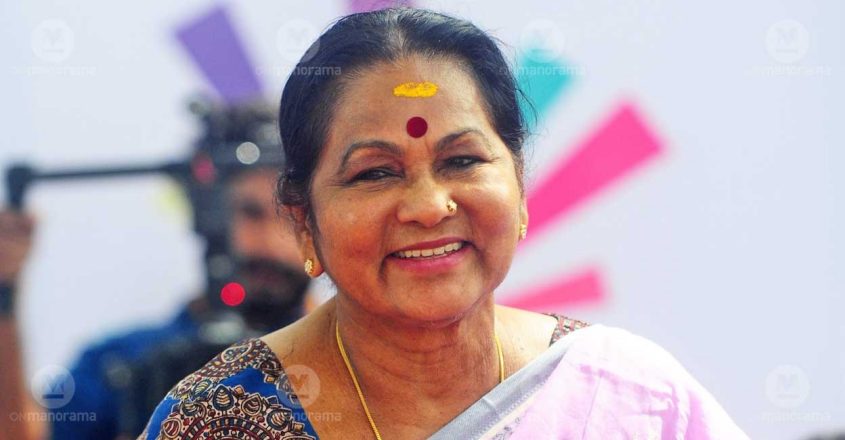
Remembrance: Malayalam actor KPAC Lalitha, a stage and screen legend

KPAC Lalitha’s first movie, Koottukudumbam (1969, Dir. KS Sethumadhavan), was an adaptation of a play, which was staged in Udaya Studio in front of producer and studio owner Kunchacko. The play turned out to be an audition for many of the performers. Kunchacko selected four actors the moment it was over. All of them, KPAC Lalitha, Alammoodan, Adoor Bhavani and Khan Saheb, were given an advance to act in the film. That kind of theatricality was part and parcel of movies of that era. With KPAC Lalitha bidding adieu, that glorious chapter has come to an end.
Lalitha was not only an actor but a member of the communist party. The Kerala People Arts Club (KPAC) was a left-wing group, which made tremendous contributions to the growth of the communist movement in the erstwhile Travancore state of southern Kerala.
KPAC’s second play, Ningalenne Communistakki (You Made Me A Communist, 1952), was a significant work of art that has an important role in Kerala’s political history. In the 1950s, KPAC was so popular that every artist wanted to be a part of it.
Also read: Renowned Malayalam actor KPAC Lalitha dies at 74
KPAC Lalitha was born as Maheswari Amma on February 25, 1948, at Kayamkulam. Her father Ananthan Nair was a freelance photographer and mother Bhargavi Amma was a homemaker. From a young age Maheswari showed an interest in art. She was very fond of dance, music and theatre. Once when she visited her father at Changanassery, in Kottayam District, where he worked, Maheswari received an invitation from the famous Geetha theatre troupe to join in their drama rehearsal. Even though her parents showed little interest in their 10-year-old daughter acting in dramas, she got selected to play a role, which turned out to be her stage debut. After that she got the opportunity to act in the play Mathrubhumi, written by the legendary playwright and actor PJ Antony. It was a rare feat for a kid like her to earn a contract with Changanassery Geetha for ₹2,000 – a more than decent amount in the late fifties.
Maheswari soon became famous in theatre circles of southern Kerala. Her adaptation skills and versatility were unique. She got invitations from different drama clubs. Actors like Sankaradi, SL Puram Sadanandan, Paravoor Bharathan, Azeez and Bahadoor were impressed by this young talent and eventually helped her join KPAC.
It was after a long interview session that Maheswari got selected as a full-time actor in KPAC and subsequently she changed her name to Lalitha.
Lalitha was a much sought-after stage actor right from her teens. When Malayalam cinema gradually developed into an industry by absorbing actors, writers and directors from theatre, Lalitha became a part of it; rather an inevitable part. She started acting at the age of 10. She continued for more than six decades.
Anubhavangal Palichakal (1971, Dir. KS Sethumadhavan) made Lalitha into a household name. She played a character called Parvathi, a working-class girl who falls in love with a communist activist, Chellappan (Sathyan), a married man. Lalitha beautifully portrays Parvathi’s love, charm and innocence in a song sequence. Even after five decades, Kalyani Kalavani Chollammini Chollu, remains evergreen and is one of the most searched B&W songs on YouTube.
Interestingly one of brightest stars of Indian cinema, Mammootty, also acted in that film as a teenaged junior actor.
Her next film, Koottukudumbam, was a superhit and made Lalitha Udaya Studio’s lucky mascot. She was a part of every movie produced by the studio.
Love interest of Sathyan, mother of Prem Nazir, wife of Mammootty – Lalitha played every role in the course of her five-decade, 550-film career.
In the late 1970s she married filmmaker Bharathan. After a short break she returned to Malayalam cinema in the ’80s. In 1990, when renowned director Adoor Gopalakrishnan made an adaptation of Vaikom Muhammad Basheer’s Mathilukal, Lalitha had a unique role in it, without being physically present. Mathilukal is a biographical short story of Basheer and Lalitha gives voice to Narayani, a female inmate, without ever appearing on screen. The movie was screened at the Venice Film Festival. It won four awards at the National Film Awards in 1990.
Take Amaram, (Dir. Bharathan, 1991) or Manichitrathazhu (Dir. Fazil, 1993) or Godfather, (Dir. Siddique Lal, 1991), and Lalitha’s performances stand out. She could establish a character and convey a range of emotions with just a murmur.
The Malayalam film industry has given us wonderful actors, but only a few women choose acting as their lifelong career. Patriarchy always made sure that young women would stop acting once they got married. Lalitha twice decided to stop acting, once when she got married and the next time after her husband’s untimely death. But she came back.
Lalitha was talented, versatile, committed. She had a lot of health problems, but she never quit. With her passing, Indian cinema has lost an icon.

